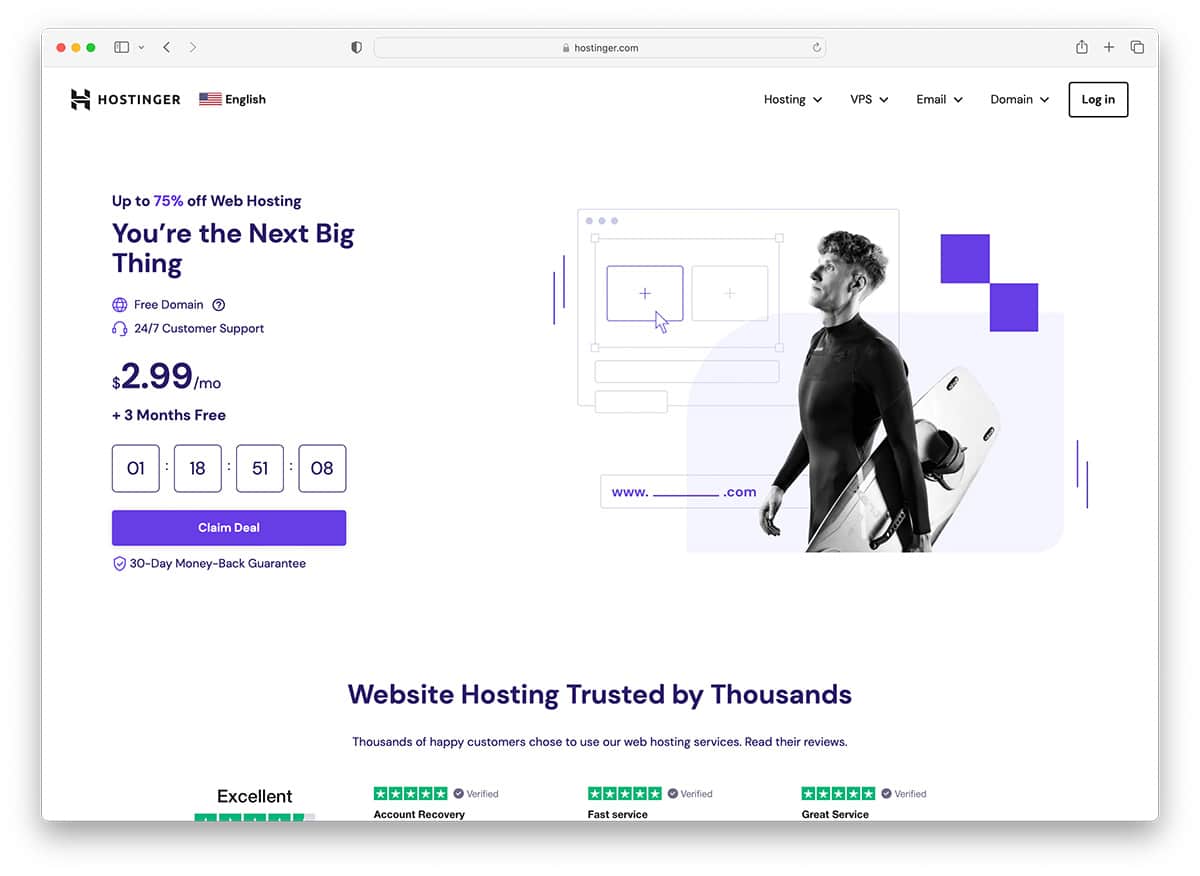
An expired security certificate can be a cause of your website going down. A security certificate expiring can lead to various problems. From blocking users to exposing the network to malicious attack, there are many things that could go wrong.
In milliseconds, the browser will verify that your SSL certificate is valid when a user visits. If this certificate is expired, a browser warning will appear saying "This connection does not feel private" or that "This site doesn't feel secure".
It's important that you note this because it tells your website visitors that they are not secure. The warning will also impact your bounce rate, as visitors will quickly click away from your page to go somewhere else.
Expired certificates can also be used by cybercriminals to steal sensitive data or infect a target network with malware. They can intercept the communication between a user's web browser and a server, impersonating a legitimate site or customer.

An expired certificate could lead to a catastrophic system outage
After an SSL expires, the encryption of communication between a web browser and its user is no longer possible. This can lead to a major outage that affects all stakeholders within an organization.
The importance of keeping track is evident in the fact that businesses must keep an eye on their SSL certificates. In this way, the enterprise can renew their SSL certificates as soon as they are due to expire.
There are plenty of tools on the market that promise to help enterprise-level organizations keep track of their SSL certificates and renew them on time, but there's no substitute for a good certificate management platform. These platforms allow you to see all of your SSL certificate information and automate when they expire.
Your business and customers are at Risk
Even though your business may be safe because you are using SSL, the certificate could still be compromised. This is because cybercriminals can reissue the certificate with their own details on it, causing your business to become unreachable.
The expiration of a certificate exposes your users to phishing scams as well as man-in-the middle attacks and SSL stripping. These attacks allow attackers access to a user's account or credit card information.

Equifax, the breach that exposed millions' of users' private information in 2017, would have been found much sooner had it not been for a expired digital certificate. The company's cyber team was not able to inspect traffic flowing through their network. As a result, they missed the hack ten month.
Enterprises may find it difficult to detect or fix outages when certificates expire. Epic Games, for example, recently experienced a certificate expiration that caused widespread outages across Fortnite, Rocket League, Houseparty, and the Epic Games Store.
Fortunately, there are ways to manage your security certificates like pros and prevent these incidents from happening. The right tools can help your company keep up with hundreds or even dozens of SSL certificates currently expiring.
FAQ
Are you a technical person who wants to design and build a site?
No. All you need is an understanding of HTML and CSS. Tutorials that teach HTML and CSS can be easily found online.
Can I build my website using HTML & CSS?
Yes! If you've been following along so far, you should now understand how to start creating a website.
Now that you know how to create the structure of a website, you'll also need to learn some HTML and CSS coding.
HTML stands as HyperText Markup Language. You can think of it as writing a recipe. You'd list the ingredients, instructions, along with directions. HTML can also be used to inform a computer if certain parts of text should appear bold, underlined and italicized. It is the language used to describe documents.
CSS stands to represent Cascading Stylesheets. You can think of CSS as a style sheet for recipes. Instead of listing each ingredient and instructing, you can write down general guidelines for font sizes, colors and spacing.
HTML tells the browser what HTML is and CSS tells it how.
Don't worry if you don't know the meaning of either one of these terms. Follow the tutorials and you will soon be creating beautiful websites.
Does A Good Portfolio Make Me More Likely To Be Hired As A Web Developer?
Yes. When you are applying for a job as a web developer or designer, a portfolio is crucial. Your portfolio should include examples of your skills.
Portfolios typically include examples of past projects. These examples can showcase your abilities. Your portfolio should include everything from mockups, wireframes, logos, brochures, websites, and even apps.
Is web development hard?
Web Development is not easy, but if you have a passion for coding, there are many online resources that can help you learn how to code.
All you have to do is find the right tools and then follow them step-by-step.
YouTube and other platforms have many tutorials. You can also download free software online like Sublime Text or Notepad++.
There are also lots of books available in bookstores and libraries. Here are some of the most popular:
O'Reilly Media, "Head First HTML and CSS"
O'Reilly Media's Head First PHP & MySQL 5th edition
Packt Publishing - "PHP programming for absolute beginners"
I hope that this article has been helpful to you.
Do I hire a web developer or make it myself?
If you're looking to save some money, don’t pay for web designing services. Hiring someone else to make your website is a good option if you're looking for quality results.
You don't need to hire expensive web designers to create websites.
If you're willing and able to invest the time and effort to create a stunning website, you can use free tools such as Dreamweaver or Photoshop to learn how to do it yourself.
You might also consider outsourcing your project to an experienced freelance web developer who charges by the hour instead of per-project.
WordPress is a CMS.
The answer is yes. It is called a Content Management System. A CMS allows you to manage your website content from within a web browser instead of using an application such as Dreamweaver or Frontpage.
WordPress's best feature is its free pricing! Other than hosting, which you usually get from your ISP.
WordPress was originally created to be a blogging platform. But WordPress now offers many more options, such as eCommerce sites or forums, membership websites and portfolios.
WordPress is easy to install and set up. To install WordPress, you will need to download the installer file from their website. Once it is downloaded, upload it to your server. After that, you can simply access your domain name with your web browser.
After installing WordPress, register for a username/password. Once you've logged in, you'll see a dashboard where you can access all of your settings.
From this page, you can add images, pages, posts, menus or widgets to your website. This step can be skipped if editing and creating content is easy for you.
If you prefer to work with a professional web designer, you can hire them to manage the entire process.
How do you design a website?
The first step is to understand what you want your site to do for your customers. What do your customers want from you when they visit your website?
What problems might they have if they don't find what they're looking for on your site?
You now need to know how to fix the problems. It is also important to ensure your site looks great. It should be simple to navigate and use.
You should have a well-designed website. It should not take too much time to load. If it takes too long, people may not be able to stay as long. They'll move elsewhere.
It is essential to determine where all your products reside before you start building an eCommerce website. Are they all in one location? Or are they scattered around your site?
It's important to decide if you want to sell just one product or multiple products. Do you prefer to sell one type of product, or several types?
When you answer these questions, your site can be built.
Now, it's time to take care of the technical aspects. How will your website work? Will it run fast enough? Can it be done quickly by people using their computers?
Will it be possible to buy something online without paying any extra? Do they need to register in order to buy anything?
These are vital questions you need to ask. You'll be able to move forward once you have the answers to these important questions.
Statistics
- It's estimated that in 2022, over 2.14 billion people will purchase goods and services online. (wix.com)
- Studies show that 77% of satisfied customers will recommend your business or service to a friend after having a positive experience. (wix.com)
- Did you know videos can boost organic search traffic to your website by 157%? (wix.com)
- It enables you to sell your music directly on your website and keep 100% of the profits. (wix.com)
- Is your web design optimized for mobile? Over 50% of internet users browse websites using a mobile device. (wix.com)
External Links
How To
What is Website Hosting?
Website hosting refers simply to the place that people visit when they visit a website. There are two types.
-
Shared hosting – This is the most affordable option. Your website files reside on a server owned by someone else. Your customers' requests travel via the Internet to your server when they visit your site. The request is sent to the server's owner who then passes it on to you.
-
Dedicated hosting: This is the most costly option. Your website is located on only one server. There are no other websites sharing space on the server. Your traffic remains private.
Shared hosting is preferred by most businesses because it's cheaper than dedicated hosting. You can use shared hosting if the company owns the server to provide the resources required for your website.
There are pros and disadvantages to each option. Here are the differences:
Shared Hosting Pros
-
Lower Cost
-
Easy to Set Up
-
Frequent Updates
-
It is available on many Web Hosting Companies
Shared hosting can often cost as little as $10/month. However, this price typically includes bandwidth. Bandwidth refers the data that you can transfer over the Internet. You may have to pay extra for large amounts of data, even if your blog only contains photos.
You will quickly see why you paid so much for your former host once you have started. The majority of shared hosts offer limited customer support. Although they will help you set up your site occasionally, you are on your own once you have done that.
You'll want to look into a provider that offers 24-hour phone support. They will help you deal with any issues that arise while your sleeping.
Hosting dedicated:
-
More Expensive
-
Less is More
-
You will need to have special skills
With dedicated hosting, you get everything you need to run your website. You won't have to worry about whether you're using enough bandwidth or whether you've got enough RAM (random access memory).
This means that upfront, you'll need to spend a bit more. But once your online business starts, you'll realize you don't need any technical assistance. You will become an expert in managing your servers.
Which is better for my business?
The answer depends on what kind of website you want to create. If you are selling products, shared hosting may be the best option. It's very easy to setup and maintain. And since you're sharing a server with many other sites, you'll likely receive frequent updates.
However, dedicated web hosting is the best way to build a community around you brand. It allows you to focus on building your brand and not worrying about managing your traffic.
Bluehost.com offers both. They offer unlimited monthly data transfers, 24/7 support, free domain name registration, and a 30-day money-back guarantee.